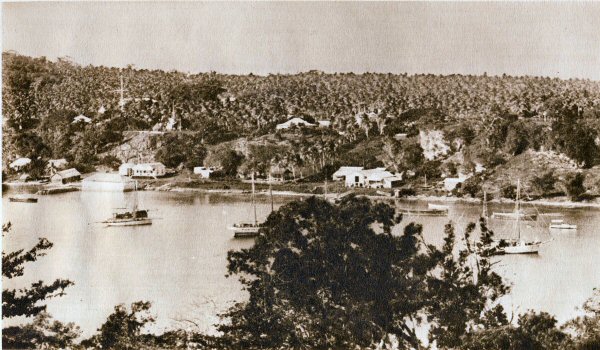
This is a copy of Figure 12 in Houses Far From Home: British Colonial Space in the New Hebrides, by Margaret Rodman
A telephone service linking Port Vila and the outlying stations, including Mele began in 1909, but mail delivery continued to be a problem. An attempt to improve the postal service precipitated an international incident. In August 1931, rumors reached the British Colonial Office in Downing Street that the French had taken the law into their own hands. This time, it was not the settlers themselves, as in the days of Franceville and Faureville, but the French Resident Commissioner who was to blame. The British Secretary of State for the Colonies, Cunliffe-Lister, wrote to the Western Pacific High Commissioner to express his concern. Was it true that "an entirely French Postal Agency has been set up ... which is independent of and in any respect competes with the Condominium Postal Service?" The Secretary of State wanted to have detailed information so that he could consider lodging a protest with the French government.

There was indeed a break-away postal service in the making. The French Resident Commissioner, Antoine Carlotti had decided to set up rural mail delivery to Mele, paid for out of French funds. Carlotti, in acting on his own initiative, violated the Condominium practice of always consulting the other Resident Commissioner before doing anything. Ironically, the postal incident was worked out through correspondence. The weekly service was supposed to go into effect on April Fool's Day, 1932, but was delayed for a week, allowing the British Resident Commissioner, Merton King, time to lodge a warning that the new service was in violation of the Protocol setting up the Condominium and ask his colleague to reconsider the plan.
The French Resident Commissioner replied that it had never been his intention to violate the Protocol. Carlotti was only thinking of rendering a service to the French colons in Mele who had to come all the way into Port Vila to post or pick up a letter. Recognizing how limited Condominium funds were, Carlotti wrote that he had rejected his first thought, which had been to hire another letter carrier specifically for the Mele service. Instead, it seemed better to have a French policeman deliver the mail to Mele and be paid by the French Residency. If the British and/or the Condominium also wanted to designate a postman, the FRC would have no objection. In any event, the new French service would carry letters destined for British planters as well as for French colons. The FRC concluded, concerned to avoid more of an international incident, that if the BRC still felt this ran counter to the Protocol he would discontinue the service.
The BRC responded that he had no objection to improving postal service to Mele and making a French policeman available to carry letters, but that this must not be advertised as a French service, because to do so would be in violation of the Protocol. Why not send a joint letter from both Resident Commissioners to the Condominium Postal Agent, M. de Gaillande, to find out why there were problems with the existing mail service to Mele in the first place? A joint letter was duly sent. The Postal Agent responded acerbically, in French on an English typewriter without accents, that the ‘existing’ service is insufficient because it has never functioned on a regular basis. If he had managed to deliver mail at all to Mele it was only through his own initiative and the use of telephone linemen who came to Port Vila from Mele to work. He would have to be able to hire another postman or else have a saddle horse at his disposal. The horse would be better suited to the muddy roads than a man on foot.
In pencil beside this paragraph of the Postal Agent's letter is written the single word "Captain." This proved to be the solution to the international postal incident. Captain was an “excellent” horse belonging to the Condominium government, pastured in the British Paddock. Ridden by the French M. de Gaillande, Captain provided postal delivery service on behalf of the Condominium from Port Vila to Mele and back, once a week for more than a year. He was no longer needed in July 1932, having been replaced by a bicycle. (Presumably the roads had improved.) A Joint letter from both Resident Commissioners was necessary to inform the Condominium Treasurer that the horse should be sold. M. de Gaillande offered to pay two pounds to buy the horse from the Condominium, but this was rejected as less than the animal was worth. In the end, the French Residency bought the horse for four pounds, a purchase price with which the British Residency officially concurred.
This text thanks to the author
Houses Far From Home: British Colonial Space in the New Hebrides, University of Hawai'i Press
Margaret C. Rodman, Professor and Graduate Director, Social Anthropology,
York University, Toronto M3J 1P3.
